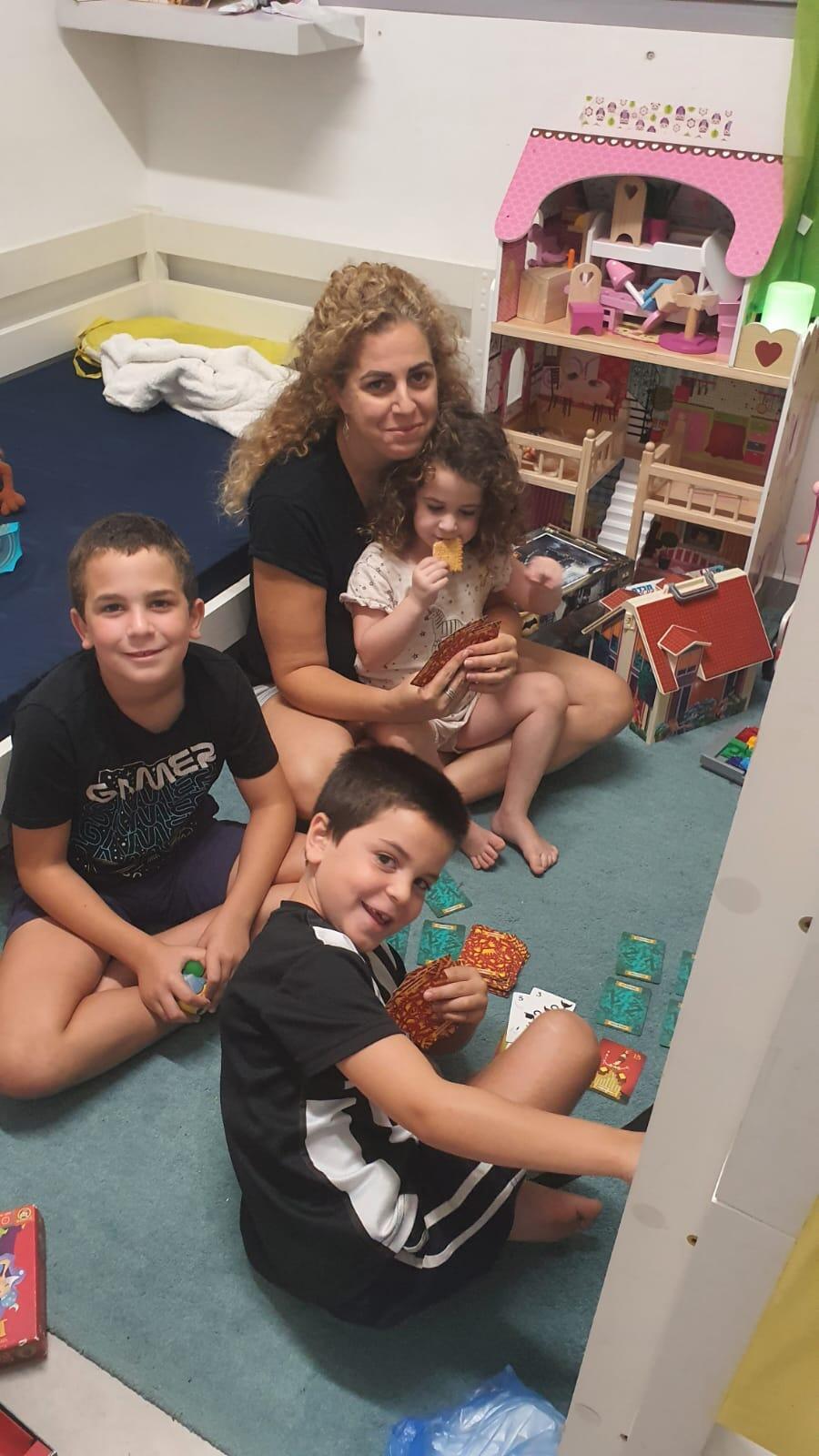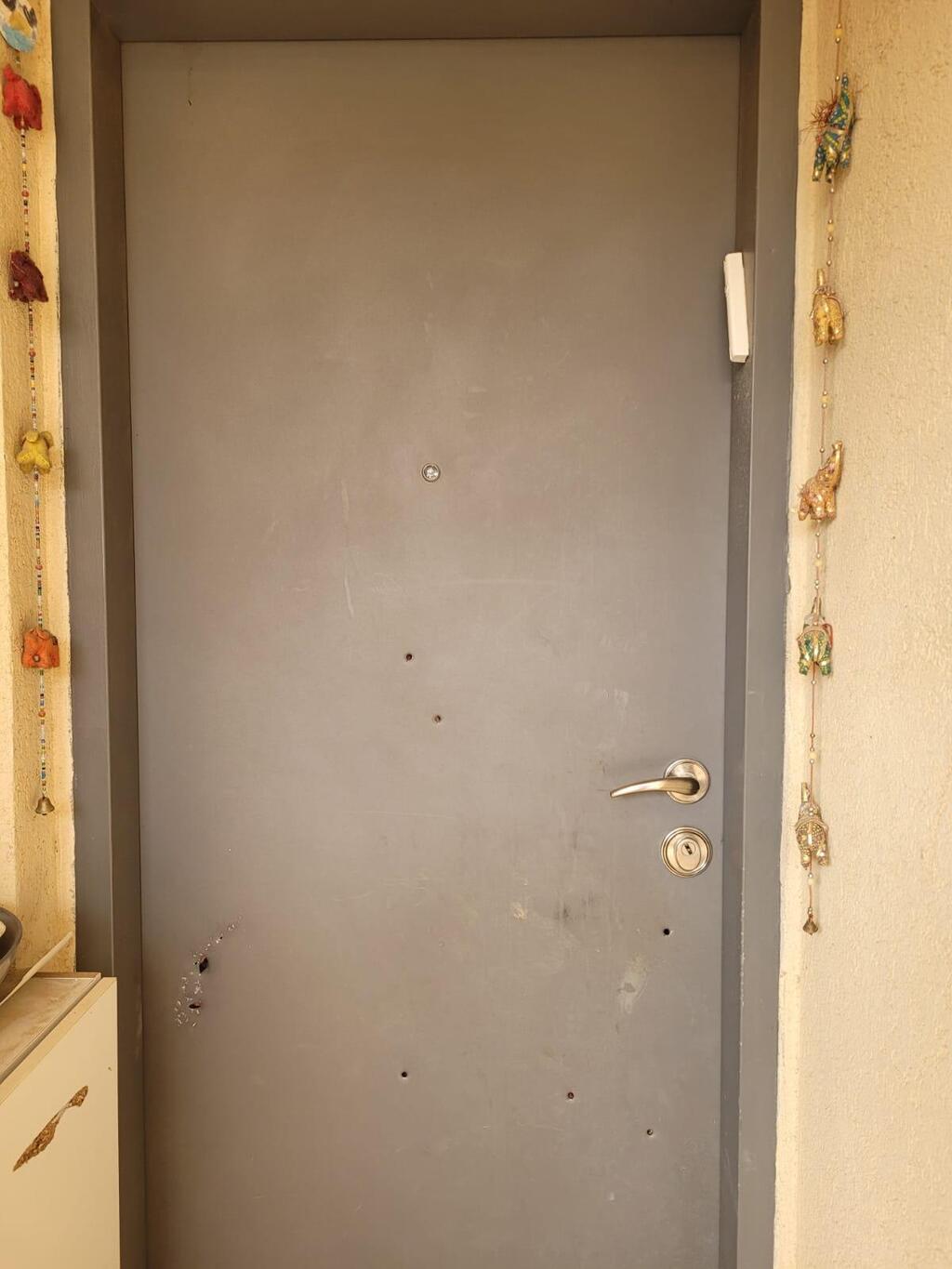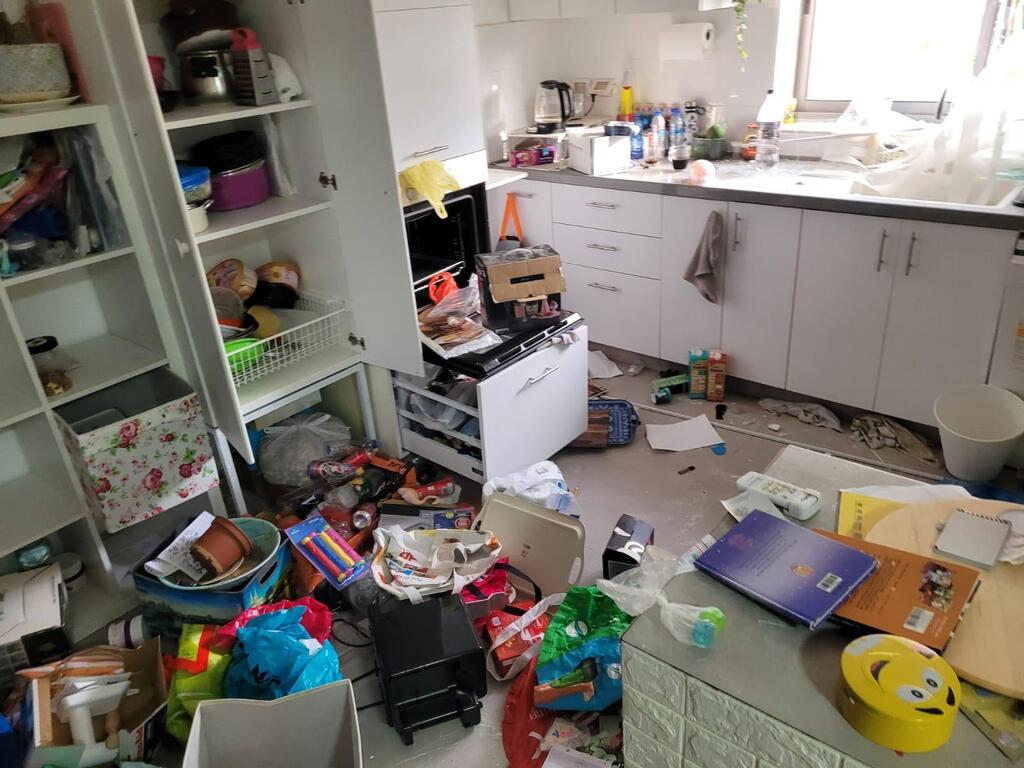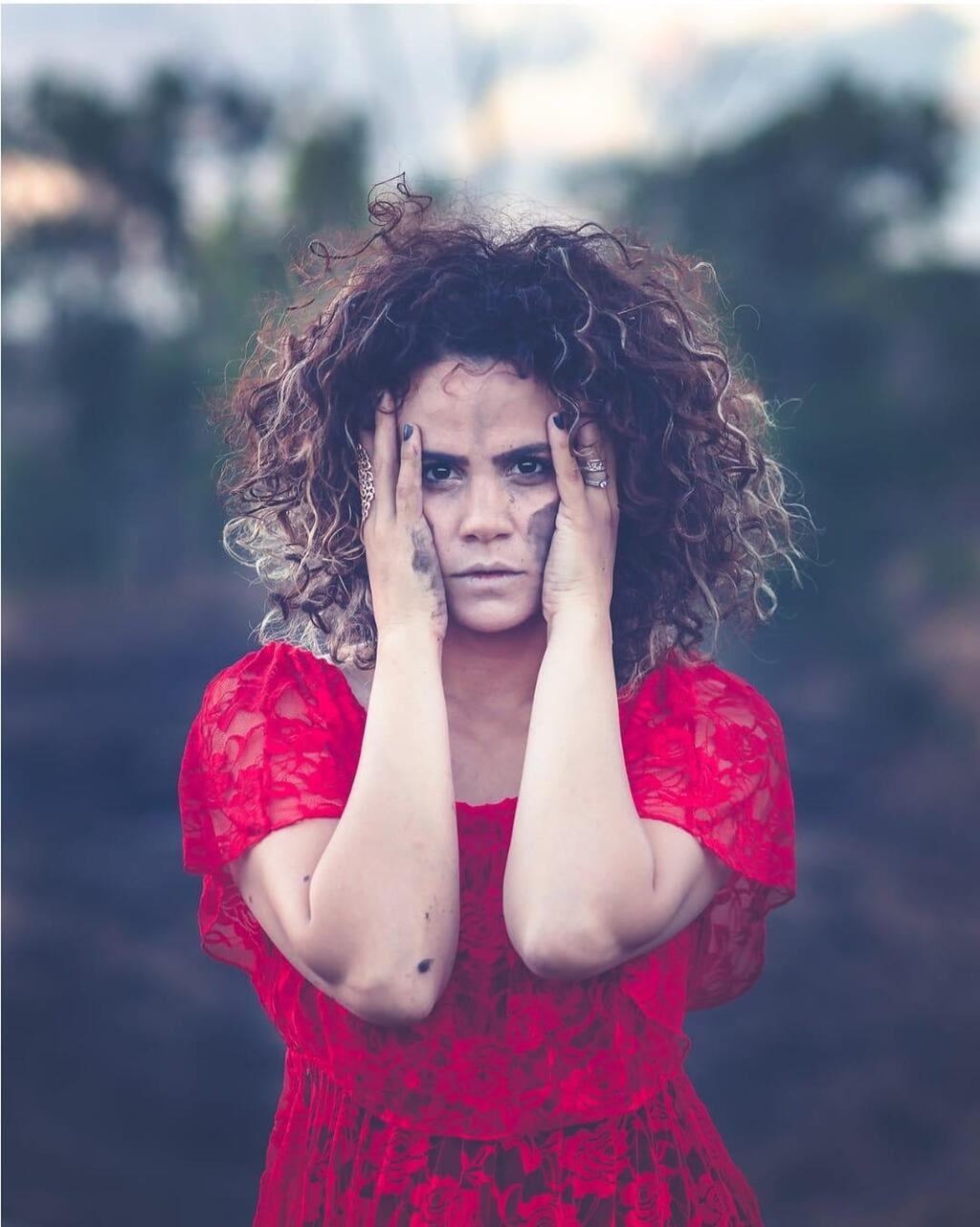Getting your Trinity Audio player ready...
"Mom, I don't want to die on my birthday"
Dalit Ram Aharon, married and mother of three (ages four, seven, and nine), Kibbutz Nir Oz
"On the same morning of the horrific massacre, we were supposed to celebrate my son's birthday, and the whole family planned to come to the kibbutz. At 6.30 am a 'red alert' siren was heard, and we all entered the safety room. We are already used to rocket fire, but this time the sirens did not stop for a moment, as did the echoes of explosions and rocket fallings. We realized that this was an unusual event we were not familiar with, and at one point my husband quickly went out of the safety room to get our cell phones, bottles of water, and some snacks. We had no idea that this decision would save us as we spent hours in the safety room."
Read more:
Ram Aharon is a member of Kibbutz Nir Oz. Her parents, both disabled, also lived in the kibbutz together with their two caretakers. Her parents' home was among the first to be broken into by Hamas terrorists in the murderous attack on that Black Sabbath on October 7.
"When they reached my parents' house, we still didn't grasp the intensity and magnitude of the incident. We knew that terrorists were walking around the kibbutz because one of the members of the alert squad texted us on WhatsApp, stating that some of the terrorists were wearing IDF uniforms and that we had to lock the house doors and be careful, but we didn't understand how many terrorists were involved and above all we didn't understand that the IDF was not there," she recalls. "I tried calling everyone I thought might be able to help my parents, but no one answered.
"My 4-year-old daughter didn't understand what was going on and started screaming; but since we needed to keep complete silence, I covered her mouth and begged her to be quiet, as if we were in the Holocaust"
"At this stage, I was still sure that the terrorists were only in my parent's house, but then scary text messages started coming from all the residents in the kibbutz, stating they also had terrorists trying to break into their safety rooms, burn down the houses, shoot everywhere and throw grenades at the windows. No one understood where the army was, but at that moment I realized we were on our own, and I started instructing my parents' caregivers on how to keep the door of the safety room shut, which at a later stage turned out to be a lifesaver. All the other houses located along my parents' street were damaged, and most of the residents there were either kidnapped or murdered."
While trying to help her parents, she also had to calm down her children, and at the same time, her husband was trying, with all his might, to keep the door of the safety room shut, attempting to prevent the terrorists who had also entered their home from infiltrating inside. "My 4-year-old daughter didn't understand what was going on and started screaming; but since we needed to keep complete silence, I covered her mouth and begged her to be quiet, as if we were in the Holocaust. She was offended by this, went to bed, and fell asleep, and the whole time the terrorists were in our house she was sleeping. It was probably a defense mechanism, and it was such a huge luck. I hugged my two sons tightly, and with the other hand I tried to call for help, but there was no one there to help."
Amidst the horrifying moments of terror and chaos, there was also that sentence of her eldest son that broke her heart. "He said to me: 'Mom, I don't want to die on my birthday.' I immediately told him that as soon as we get out of there, we will have the best birthday party ever, and will celebrate life. It was extremely important for me, albeit being in the most dangerous and unprotected place, that the children will have some kind of security left, and that they know we will always do whatever we can to protect them, no matter what. This is also why we decided that as long as there is a threat in the area, we will not return to Nir Oz, but will rather stick to our community and follow it wherever it goes."
The terrorists were in their house for a whole hour, during which they vandalized the house and looted everything they could lay their hands on. "In retrospect, we realized that we were 'lucky', because after several unsuccessful attempts to break into the safety room, they gave up and contented themselves with stealing items, passports, and wallets and vandalizing the house. Among the terrorists we even heard a child's voice.
"There was a moment when they started drilling, and until now we don't know what was the purpose of this drilling. We were also afraid that they set boobytrap inside the house. One of the stressful moments was when our mobile phone batteries were completely discharged; our relatives were terrified and wanted to know what was going on; I was in contact with my parents all the time and I was afraid that if I didn't guide the caregivers, the terrorists, who set up a real headquarters in their house and settled in, would manage to infiltrate the safety room. We were also afraid that no one would be able to help us and get us out of the house. Having no other, choice my husband went out of the safety room for a few seconds to get the chargers. The children were very scared; my little daughter has experienced fear of abandonment ever since. "
These days the members of the Ram family stay at a hotel in Eilat, along with the other kibbutz members who survived the massacre. In the last few days, an 'education system' started operating at the hotel, and for the parents, this is a great relief. "At first my daughter had trouble leaving us and entering the class without us being present, but gradually she overcame and managed to let go. We talk to her, trying to explain things in the easiest way for her to understand," says Ram Aharon.
"Yesterday, for example, she told me of a dream she had in which she heard a 'red alert' siren, she was afraid, woke up, and cried, but none of us heard her. I told her that if there was a next time, she should wake us up immediately and that we are always here for her and will always do everything in our power to protect her and her siblings. She also talks a lot about her fear of being injured or killed. She hasn't asked yet about her best friend Ariel (Shiri Biebs' son who was kidnapped along with his mother and his nine-month-old brother, Kfir").
"It is not easy to provide support for children who experienced such trauma, certainly not in the first days after the massacre when we were all in a state of total shock. Even after we were evacuated, we were unable to talk and process the course of events, because although we moved to a protected shelter, terrorists were still walking around the kibbutz, while clouds of fire and a burnt smell covered everything, and the sounds of gunfire and rockets wouldn't stop. From the moment we arrived at the hotel, we were embraced and provided with amazing support, from both the hotel staff and former kibbutz members who no longer live in Nir Oz but left everything and came to be with us. The children are safe and manage to sleep at night; we take sleeping pills and, of course, are also treated by psychologists and social workers."
Alongside all this, she also knows that the fact that she and her family survived cannot be taken for granted. "One out of four kibbutz members was either kidnapped or murdered. There is almost no family from Nir Oz that came out of this massacre unscathed, and it is clear to me that this was 'Russian roulette' - if more professional terrorists had entered our house instead of the looters, we would probably have been hurt as well. The feeling of 'survivor guilt' exists, and there are moments when I catch myself looking at the children, hugging and kissing them, and saying to myself: 'Thank God that you are with me. Thank you, thank you, thank you'. I understand how lucky we were, and this is not obvious. "
"The children are afraid that the terrorists will come back to kill them"
Dorin Re'ee, married and mother of three (ages seven, seven and a half, and nine), Kibbutz Nir Oz
"The barrage throughout that Saturday was particularly long. We were all in the safety room and the children were sitting on a blanket that I spread between the bed and the closet, as far away from the window as possible. I covered them with a duvet, but at this stage, I still didn't understand that besides rockets that were fired, terrorists also infiltrated the kibbutz," recalls Re'ee, who has been living in Kibbutz Nir Oz with her family for 13 years.
"Within a few seconds, we started hearing gunshots, and I remember thinking it was very strange that there were both 'red alert' sirens and gunshots at the border. The shooting sounded very close, as if it took place right outside our window. At that moment I stepped out of the safety room to let our dogs into the house, as they refused to enter the safety room and brought us some food and water. Later I went out a few more times to check that the dogs were okay, and then I noticed that the shutters in the living room window were slightly closed, and the screen was moving. I had the feeling that someone had tried to enter the house, but maybe got scared of the dogs and left. I was debating whether to let the dogs in the safety room all the same and in retrospect, it's good that I didn't, because it would have taken me a lot of time and chances are that I would have been hurt."
When she returned to the safety room, she realized she was not at all hallucinating and indeed someone had tried to break into her house. "One of the members of the Kibbutz's alert squad texted a message on the group WhatsApp that there were terrorists in the area of the clinic and asked us to lock the doors and not open them to anyone. A few seconds passed and we heard intense shooting inside our house. The terrorists shot the door and windows, barged into the house, and started screaming in Arabic 'Allahu Akbar'. It felt as if there was a large group of terrorists inside our house."
While her husband was fiercely holding the door knob of the safety room, she decided to tell her children what was happening. "They were scared, started crying, and covered themselves with the blanket and refused to take it off. I begged them to take off the blanket from time to time because they turned red and I was afraid they would suffocate. "
The terrorists, she recalls, walked in and out of the house several times while they were there. They smashed the windows and kept on screaming and shooting. At the same time, they tried to open the door of the safety room and almost succeeded, but her husband, with unexplained and supernatural strength, held the doorknob and didn't let go. She hugged her children and feared for the safety of the dogs that were left outside.
The children are afraid that the terrorists will return to kill them while asleep. My daughter keeps asking me: 'Mom, why did they kill Tamar? And why did they kill her children? And why did they kill Johnny? She also asks if her friend who was murdered suffered before she was killed, and she is very worried about Yuval Engel, her friend from the kibbutz who was kidnapped.
"We were besieged in the safety room from 6.30 a.m. to 7.30 p.m. When the IDF soldiers came to rescue us, we were afraid to open the door. My daughter screamed and begged us not to open it, she was sure they were terrorists coming back to kill us. When we finally opened the door, the charming soldier looked her in the eyes and apologized for startling her. He explained to her that they had come to rescue us and asked us to hurry because battles were going on outside, there were terrorists and rocket fire."
Like the Aharon family, the Re'es' were also moved to the protected shelter of the kibbutz until the evening hours of the next day, and now they are staying together with the other kibbutz survivors at a hotel in Eilat, and miraculously also with their two dogs that were found after the terrorists tried to take them to Gaza as well. "All of us suffer from trauma. The children, as well as our dogs, get startled at the tiniest noise. My husband was among those who walked around the kibbutz with the soldiers and collected some of the bodies of the residents. He saw our beloved friends there, some of them were shot in all parts of their bodies and some were burned while alive, and it is very difficult for him," she says.
"During the day the children are busy in educational framework, and spend time with their friends from the kibbutz, but the greatest difficulty comes mainly before bedtime; they are afraid that the terrorists will return to kill them while asleep. My daughter keeps asking me: 'Mom, why did they kill Tamar? And why did they kill her children? And why did they kill Johnny? He was so nice and made us laugh a lot' (these are all members of the Kedem Siman Tov family from Nir Oz who were brutally murdered in their home). She also asks if her friend who was murdered suffered before she was killed, and she is very worried about Yuval Engel, her friend from the kibbutz who was kidnapped.
"It's hard to be a mother in a situation like this. I don't want to cry near the children, and it's not easy to hide the tears when throughout the day I remember the people I knew and loved who were murdered and kidnapped," she says.
When asked if they plan to return to Nir Oz in the future, she replies that there is no prospect of a return, at least not in the next two years. They do not intend to leave the community and, like Ram Aharon, she also believes that to recover, they need to be with people who have undergone the same trauma that they have experienced. "And despite all that, I want to believe that one day, when the threat is completely removed and the kibbutz is restored, we will be able to return and show our enemies that we cannot be defeated."
"The boy dreamed that he was killing terrorists; 'Mom, you see that I'm a hero'?"
Moran Hila Madmoni, married and mother of two sons (13 and 8), Sderot
"There is no post-trauma in Sderot, but rather an ongoing trauma," says Moran Hila Madmoni who is now staying at a hotel in Eilat with her family, after they rescued themselves from Sderot while rockets were flying overhead and the IDF was fighting fierce battles with Hamas terrorists who had infiltrated the city. "The children's frustration tolerance is unusual these days. My eldest son has been stuttering since 'Tzuk Eitan' (military operation in Gaza which was held in August 2014), and in two months we were supposed to celebrate his Bar Mitzvah. I have no idea what will happen now. "
On the day before that Shabbat, Madmoni hosted her relatives at her home. Her parents, residents of Beit Shemesh, stayed overnight. Throughout that day she felt sick and was having an anxiety attack. That night she had trouble falling asleep, and early in the morning, she tried to wake up her husband and children to go to shul. Unlike other times, this time they had trouble waking up, which might have possibly saved their lives.
"That morning I suffered from severe vomiting. I was lying on the couch pale and exhausted, and then there was a 'red alert' siren. We all ran to the safety room, and very quickly realized that this was not a normal incident of missiles firing. There was a lot of noise, the booms and sirens wouldn't stop. My husband and I immediately understood that it was something unusual, but we didn't say a word so as not to alarm the children and my parents, who are not used to this situation," she recalls.
In the only moment of quiet, Madmoni and her husband went out to the balcony trying to figure out what was going on outside. "Instead of clouds, there were interceptions in the sky, and a few meters from us, in the industrial area, a huge fire broke out and a bunch of shots were heard. My husband was sure that these were the sounds of explosions from the nearby factory, but my father immediately realized that these were the sounds of Kalashnikov gunfire. "
They returned to the safety room while sirens, shouting, and live gunfire were constantly being heard. At these moments, Madmoni began to empty the closet of its contents so that she could put her children in there in case the terrorists broke into their home. For eight hours they sat in the dark safety room and talked to each other in whispers.
"After eight hours I decided to go out of the safety room to check what was happening outside. I tiptoed out, like a thief inside my house, and peeked through the door peephole. Suddenly I heard someone shout: 'Quick, quick, soldier. Come here, they are on the roof.' I went up to the roof and saw tanks moving through the streets, combat helicopters in the sky, and a group of about 20 men dressed in black uniforms holding drawn weapons. At that moment I froze to the spot. Later I realized that these were IDF soldiers who were fighting with Hamas terrorists who climbed onto the roofs of the houses. It was like a scene from a Rambo movie in the middle of the Holocaust. In the past we lived in an illusion, believing we could manage a peaceful life, but this is not the case here, we must be more powerful and cruel than the enemy, otherwise, they will annihilate us. We refused to fight, and thus we were slaughtered."
On the night between Saturday and Sunday, they had trouble falling asleep. Her husband slept in the living room, believing that if the terrorists saw him there, they would think he lived by himself and wouldn't try to break into the safety room. Her young son woke up screaming in terror and asked to leave the city. "At that moment I decided to leave Sderot, no matter what. I started packing like crazy, and we decided to leave in the morning because at night there were incessant rocket barrages and terrorist groups were still roaming the city. "
In the afternoon they finally managed to get into the vehicles and exit the city. The sights before their eyes were horrifying. "In the square, there were rivers of blood, discarded gloves of Zaka (Israeli search and rescue organization), and shoes. The nearby supermarket was completely smashed and there were abandoned cars on the traffic islands. Further down the road, we encountered about 60 soldiers who were fighting terrorists. The traffic lights were broken, the children were sitting in the car bending down and I screamed at my husband to step on the gas and get out of there as fast as possible. We left Sderot and I have not been the same since then. This was also the moment when I decided not to go back to Sderot as long as Gaza exists. "
Madmoni, an emotional therapist who has begun to engage in national Hasbara in recent years, says with pain that she chooses not to deal with the trauma now and promises that she will allow herself to fall apart when the right time comes. "Right now, I don't have time to emotionally collapse. I need to stay strong for my family, and use my mental strength to engage in Hasbara, telling and passing on what we experienced that day. It's very difficult to be a mother at a time like this, but women have enormous power of survival and we can fall apart and be strong at the same time. However, it is important for me to convey a message to all parents: you are allowed to cry and you are allowed to fall apart.
"The children talk about their feelings. We don't push them; we just listen and try to answer questions as much as we can. On the first night away from home, the younger son woke up screaming. He dreamed that terrorists were breaking into his grandmother's house in Beit Shemesh, where we spent the night after we escaped from Sderot, and that they were trying to harm his aunt's baby. In his dream, he took a gun and killed them all - 49 terrorists from Hamas and Jihad. He remembered the exact number from the dream. Then he asked me: 'Mom, what a hero I am, right? My older son previously said when interviewed that the terrorists want to conquer us. He was told that no one would remove him from of his house, and now he reminds me of it, saying: 'You see, prophecy has been taken from prophets and given to fools and children'." (i.e., there's no way of knowing what the future holds).
Like the other evacuees and survivors of the massacre, Madmoni also praises the hotel staff and the many volunteers who embrace them and take care of all their needs, as well as Alon Davidi, the mayor of Sderot, who left the city for a few hours to visit Sderot residents at the hotel. "Sderot has become a military base and it hurts terribly, but I know that if we stay united - we will win and come out of this crisis stronger than ever."





